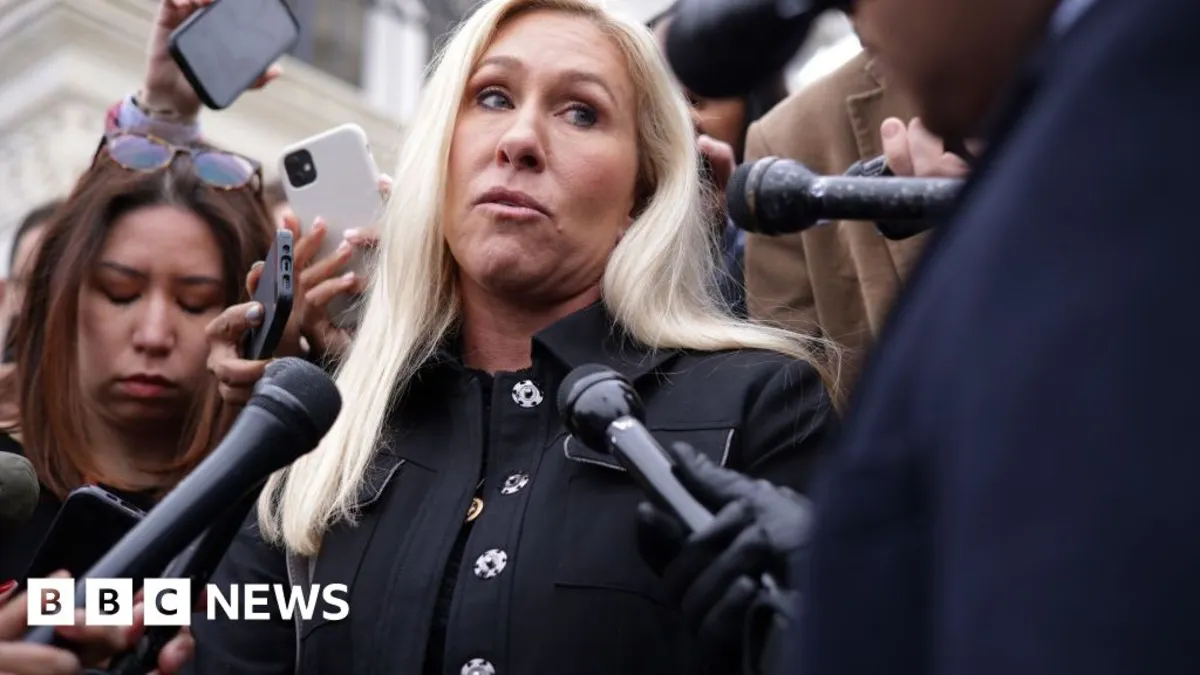
In a stunning political twist, Marjorie Taylor Greene has announced her resignation from Congress effective January 5, marking the end of her five-year tenure. This surprise decision follows a significant fallout with former President Donald Trump, who publicly criticized her and labeled her as a traitor. Greene's abrupt exit has sparked a wave of speculation regarding her future political ambitions and career direction.
Greene’s decision to resign comes on the heels of her vocal criticisms of the Trump administration, particularly concerning its refusal to release files related to the investigation into the late sex trafficker Jeffrey Epstein. Her ongoing disputes with Trump, who has since stated he would endorse her opponent in the upcoming election, have fueled rumors about her political future. Greene's recent comments on various issues, including Trump's tariffs and his stance on healthcare funding, suggest she has distanced herself from the former president and the party's mainstream views.
Although Greene has publicly dismissed rumors of a potential run for the presidency in 2028, political analysts believe she might change her mind. After signing a petition to compel the release of Epstein-related files—a move that contradicted Trump’s wishes—some insiders speculate she could position herself as a strong candidate for the Republican nomination in the future. Ro Khanna, a Democratic congressman, recently suggested that Greene resonates more with Trump's base than Vice-President JD Vance, indicating her potential appeal within the party.
In response to the swirling rumors, Greene took to social media to clarify her stance, asserting, “I’m not running for President and never said I wanted to.” However, the unpredictable nature of U.S. politics often leads to unexpected shifts in ambitions, making her future political moves a topic of ongoing interest.
While Greene has denied aspirations for the presidency, she has not ruled out running for the Georgia governorship or a seat in the U.S. Senate. With elections for both positions scheduled for 2026, Greene could capitalize on the changing political landscape in Georgia, especially as two-time Republican Governor Brian Kemp is term-limited and unable to run again. Greene’s name has emerged as a possible contender to unseat incumbent Jon Ossoff in the Senate, as both roles have been areas of interest for her in the past.
Trump's public commentary on Greene’s political prospects suggests he is not supportive of her ambitions, stating that she would be unlikely to win either race without his endorsement. According to Kerwin Swint, a political science professor, Greene's popularity may diminish outside her immediate district, making a statewide run challenging.
As Marjorie Taylor Greene navigates her next steps, some analysts predict she may pivot towards a career in conservative media. Swint believes she could start a podcast to maintain her public profile and influence. This trend has gained traction among former politicians, with examples like Matt Gaetz and Dan Bongino successfully transitioning into media roles after leaving Congress.
With the rise of podcasts among political figures, Greene may also explore opportunities as a conservative commentator, potentially even on more liberal networks like CNN, where she has made recent appearances. Her ability to engage with diverse audiences could bolster her influence beyond traditional political avenues.
Marjorie Taylor Greene’s resignation has opened a new chapter in her political journey. Whether she pursues a future in political office or transitions into media, her next moves will undoubtedly be closely watched by both supporters and critics alike. As speculation swirls regarding her aspirations, Greene’s ability to adapt in the evolving political landscape will be a defining factor in her next steps.